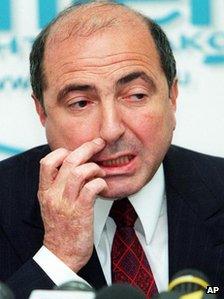Boris Berezovsky: Few tears in Russia for 'master of chaos'
- Published

Boris Berezovsky represented a certain era for many
While the investigation into Boris Berezovsky's' "unexplained" death continues in Britain, in Russia - for now - the focus is less on the circumstances surrounding it and more on the significance.
This is because, although Mr Berezovsky had been away from Russia and in self-imposed exile for 13 years, he had amassed such wealth and political influence here in the 1990s that he will be remembered as one of the key figures in modern Russian history.
Love him or hate him, to the Russian media the death of Boris Berezovsky marks the end of an era.
On its website this morning, the pro-Kremlin newspaper Komsomolskaya Pravda described Mr Berezovsky as having been "clever, cunning, resourceful... a master of chaos". It said the fallen oligarch had been a "talented mathematician who became the great schemer".
Another tabloid, Moskovsky Komsomolets, likened Mr Berezovsky to a "giant spider who managed to entangle so many top officials in his web". It described him as an "incredibly talented man who played the role of an evil genius in the 1990s".
Novaya Gazeta, normally critical of the Kremlin, took aim at Mr Berezovsky. "He viewed Russia as a chess board," an editorial argued on its website, "but one on which only he would be allowed to move the pieces."
Eventually the "grandmaster" of Russian politics was defeated by Vladimir Putin.
And yet it is widely accepted that at the end of the 1990s, Boris Berezovsky was instrumental in bringing Vladimir Putin to power. As Novaya Gazeta claimed, Berezovsky "was there when the idea arose of putting a sensible security services agent on to the Russian throne".
'Pardon'
President Putin has not commented directly on Boris Berezovsky's death but the Kremlin spokesman, Dmitry Peskov, reacted to the news on Saturday.
He said that two months ago the oligarch had written to the president apologising for his "many mistakes" and requesting permission to return to Russia. When contacted by phone today by the BBC, Mr Peskov said there were no plans to publish the letter.
Russian nationalist MP Vladimir Zhirinovsky confirmed for the BBC that Mr Berezovsky had been hoping to return home. Mr Zhirinovsky said he had met the oligarch in Israel during the New Year holidays. "He said he wanted to come back, on any terms," Mr Zhirinovsky said, "as long as he received a pardon."
Today former Deputy Russian Prime Minister Boris Nemtsov said that Boris Berezovsky would be remembered as the "ideologue and architect of oligarchic capitalism".
He recalled how Mr Berezovsky had tried to "control the Russian government" in the 1990s. "We didn't let him, so he fought with us," Mr Nemtsov said.
Meanwhile, on the streets of Moscow, I found little sympathy for the late businessman.
To many ordinary Russians, oligarchs' fortunes are ill-gotten gains. With the help of their political connections, the tycoons had struck super rich at a time when so many Russians had slid into poverty.
"The fewer the oligarchs, the better for us," factory worker Roman told me. "Berezovsky... he tried to turn everything in Russia upside down."
- Published24 March 2013
- Published23 March 2013
- Published24 March 2013